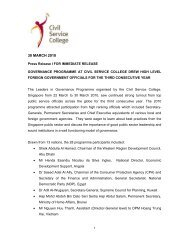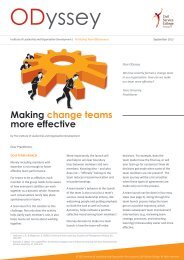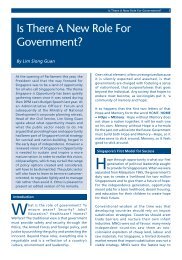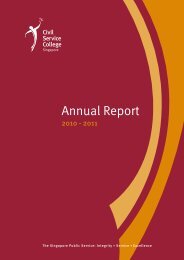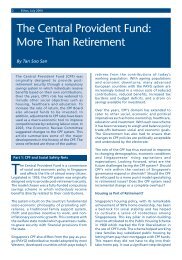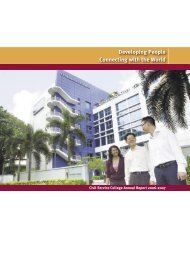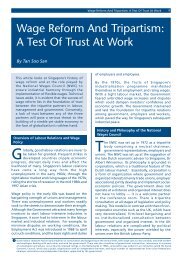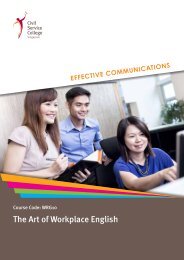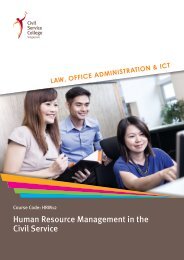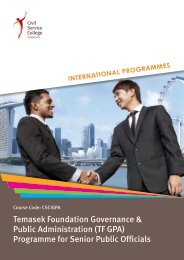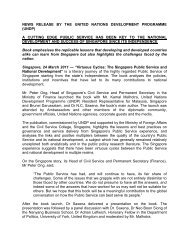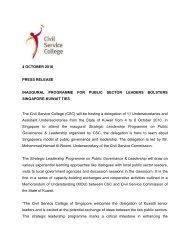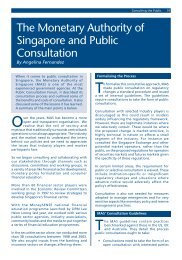Public Consultation Toolkit - Civil Service College
Public Consultation Toolkit - Civil Service College
Public Consultation Toolkit - Civil Service College
Create successful ePaper yourself
Turn your PDF publications into a flip-book with our unique Google optimized e-Paper software.
<strong>Public</strong> <strong>Consultation</strong> <strong>Toolkit</strong> 29 30 <strong>Public</strong> <strong>Consultation</strong> <strong>Toolkit</strong><br />
Case 9:<br />
Contract period and early termination charges<br />
for telecommunication services offered to consumers<br />
Agency/country:<br />
• Infocomm Development Authority (IDA), Singapore<br />
Background:<br />
• In December 2008, IDA proposed to issue Guidelines on the maximum contract period<br />
and early termination charges (ETC) that providers of residential fixed-line, mobile and<br />
broadband services could impose on consumers. The Guidelines specified that:<br />
- The maximum contract periods should not exceed 24 months; and<br />
- Consumers who signed contracts that were longer than three months and who<br />
terminated their contracts before the end of their contract period should not have to pay<br />
a fixed ETC. Rather, ETCs should decrease over time.<br />
• In proposing the Guidelines, IDA considered that long contract periods and excessive ETCs<br />
may unfairly penalise consumers and hinder them from legitimately terminating services<br />
and switching operators.<br />
• IDA issued the final Guidelines in December 2009 and issued a press release to explain the<br />
Guidelines. IDA worked closely with the media to ensure that the public was made aware of<br />
the changes that would be put in place.<br />
• The final Guidelines were accompanied by an explanatory memorandum setting out IDA’s<br />
views and responses to the key comments received from the earlier consultation, and the<br />
considerations behind IDA’s decision.<br />
• IDA provided the operators with a three and a half month lead time to implement the<br />
Guidelines. Over the next few months, IDA continued to provide guidance to both operators<br />
as well as consumers on the implementation of the Guidelines.<br />
Learning points:<br />
• For issues in which public feedback and support is important, it is necessary to proactively<br />
engage the mass media to ensure that any consultation is widely publicised.<br />
• It is also important to ensure that technical policies are clearly explained and the materials<br />
made available are easily understood by the wider populace.<br />
• As part of the overall stakeholder management strategy, for decisions which may adversely<br />
affect any stakeholders, it is important to engage the stakeholders and provide some form of<br />
advance notification prior to announcing the final decision.<br />
<strong>Consultation</strong> process:<br />
• IDA conducted a public consultation on the proposed Guidelines on 23 December 2009,<br />
which lasted four weeks.<br />
• To ensure the issues were understood by the wider public, IDA avoided using industry jargon<br />
in the consultation paper, but tried to explain the issues and the proposed solutions in<br />
simple clear language.<br />
• IDA worked closely with the media to explain the issues in the consultation.<br />
Outcomes:<br />
• IDA received 13 sets of comments – three from telecommunication operators and 10<br />
from individual consumers. Consumers were overwhelmingly in favour of the proposed<br />
Guidelines, while responses from the telecommunication operators were mixed but<br />
generally negative. The media published two articles and an editorial on the proposed<br />
Guidelines.



